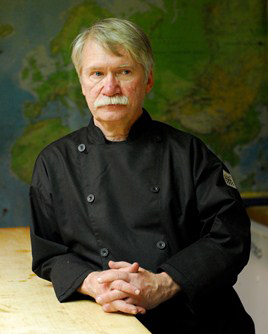Think Tank: Train the Trainer, Teach the Teacher
10 September 2014
 How adept are your faculty at integrating technology in the kitchen and classroom? Are you training and teaching them to understand issues relating to farming, processing, packaging and shipping of raw materials used in kitchens? Great teachers, like excellent employees in any field, thrive on self-improvement.
How adept are your faculty at integrating technology in the kitchen and classroom? Are you training and teaching them to understand issues relating to farming, processing, packaging and shipping of raw materials used in kitchens? Great teachers, like excellent employees in any field, thrive on self-improvement.
By Paul Sorgule, MS, AAC
Your facilities are in order, all of the collateral pieces are designed with wonderful pictures of incredible food and the smiling faces of your students, the website is up to date and your curriculum has been designed with input from accrediting agencies and industry leaders. You invested the time and energy seeking the best possible faculty.
So, everything is ready to go. Open the doors and let the students in. Is anything missing?
When institutions such as yours build their checklists for successful design and implementation of a culinary program, there is far too often one critical piece missing. Staff training and development, just as is the case in restaurant operations, falls victim to the deadly budget cut. Let’s think about this for a moment.
Administrators would likely agree that their most valuable asset is the cadre of great teachers they hire. These great teachers are dedicated to their chosen profession and excited to share their knowledge with students.
This bank of knowledge and experience they bring to the table has a short shelf life with respect to an industry that is evolving at an incredible rate. It is also common knowledge that the method of delivery used in the classroom, or kitchen, has a direct relationship to the generation on the receiving end. Without ongoing exposure to new concepts and techniques both in the fields of culinary arts and education, the best teachers will become complacent and less effective in their role. Are you training and teaching your faculty about alternative methods of delivery?
We understand that technology in the kitchen and in the classroom is driving exponential change. To ignore the importance of building teacher competence in both areas is to deny your students the opportunity to graduate with the most appropriate skill sets. Have you adopted a platform for online delivery or enhancement of your curriculum? How adept are your faculty at integrating technology in the kitchen and classroom? Are you training and teaching your faculty about the use of technology?
We all understand that the public’s interest in and involvement with the source of ingredients used in cooking has grown in leaps and bounds. Are you training and teaching your faculty to understand issues relating to farming, processing, packaging and shipping of the raw materials used in kitchens?
There is no question of the heightened concern for a healthy diet. We know that “Tell me what you eat, and I will tell you what you are” is truer today than it was when Brillat Savarin made the statement in The Physiology of Taste. Heart disease, diabetes, obesity and certain forms of cancer can all be connected to a person’s diet. Are you training and teaching your faculty about nutrition and how modern food preparation should take this into consideration? Are you, as a result of this training, incorporating different techniques in your training kitchens?
Food establishments are inundated with requests to accommodate food allergies and intolerances, vegetarianism, vegan diets, weight loss, sodium restrictions and calories counts. Are you training and teaching your faculty about these new responsibilities, and are they prepared to relay this information to students in their classrooms?
Social media is a way of life, so ingrained in our culture that some even consider its use in their daily routine to be essential. Are you teaching and training your faculty about the professional use and benefits of using social media? This may be the most effective way for faculty to stay in touch with their students.
Great teachers, like excellent employees in any field thrive on self-improvement. To deny them the opportunity is not only detrimental to your mission, it may eventually result in their departure for an employer who respects this need.
Invest in your faculty; it is as important, if not more important, than a new range in the kitchen or a revised glossy brochure referencing how cutting edge your program might be. Your faculty members need opportunities to attend conferences and workshops, become actively involved in professional organizations, receive frequent in-service training sessions from internal and external experts, and feel the excitement of the changes taking place in culinary=arts education.
PLAN BETTER—TRAIN HARDER.
Paul Sorgule, MS, AAC, president of Harvest America Ventures, a “mobile restaurant incubator” based in Saranac Lake, N.Y., is the former vice president of New England Culinary Institute and a former dean at Paul Smith’s College. Contact him at This email address is being protected from spambots. You need JavaScript enabled to view it., www.harvestamericaventures.com.
Additional Info
- CAFÉ Talks Podcast Lesson Plan: 11
